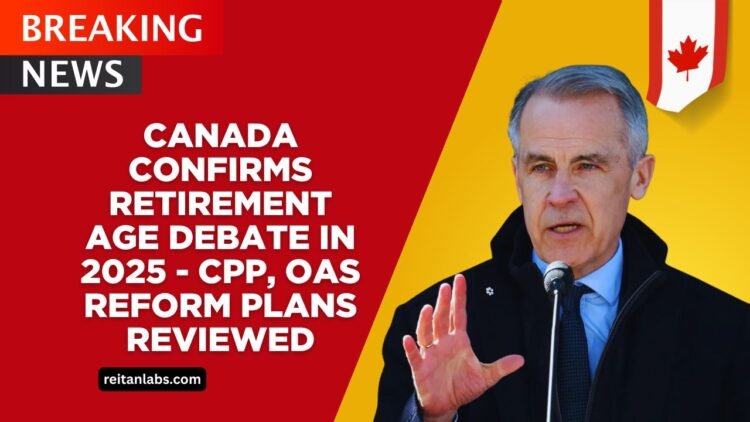Canada is facing a big debate about retirement rules in 2025. With rising inflation, people living longer, and pressure on pensions, many are asking if the current retirement age of 65 is still fair.
Right now, Canadians can claim full Canada Pension Plan (CPP) and Old Age Security (OAS) benefits at age 65. But experts and lawmakers are thinking about new changes that could affect millions of people planning for retirement.
In this article, we’ll explain why retirement rules may change, the proposed reforms, how they could affect workers and seniors, and what Canadians should expect in the coming years.
Why Canada’s Retirement Age Is Being Debated
Several important reasons are pushing the government to review Canada’s retirement policies:
- Aging population – By 2030, more than 20% of Canadians will be over 65, creating more demand for pensions.
- Longer lifespans – Advances in healthcare mean retirees are living longer, so pensions must last longer.
- Rising costs – Inflation is making it harder for seniors to retire comfortably at 65.
- CPP and OAS pressure – Many experts warn that the pension system may not remain sustainable without changes.
All these factors are making policymakers reconsider how and when Canadians should retire.
Policy Proposals Under Consideration in 2025
Lawmakers are looking at several possible reforms to strengthen Canada’s retirement system:
- Raising retirement age – Gradually increasing the retirement age from 65 to 67 by 2030.
- Flexible pension access – Allowing workers to partially withdraw CPP from age 60, even if they continue working.
- Higher CPP contributions – Asking high-income earners to contribute more.
- Deferral rewards – Increasing bonuses for seniors who delay claiming benefits after age 65.
- New tax credits – Giving tax incentives to seniors who stay in the workforce past 65.
These proposals aim to balance financial sustainability with fairness for retirees.
How Proposed Changes Could Affect Different Groups
The impact of these reforms will not be the same for everyone:
- Ages 60–64 – Canadians may still retire early, but benefits will be smaller. More flexible work-and-retire rules could apply.
- Current retirees – No immediate changes are expected, but future benefit adjustments or indexing could be affected.
- Younger workers – Likely to face a later retirement age and higher CPP contributions.
For people in physically demanding jobs, working beyond 65 could be very hard, and many advocacy groups are asking the government to protect vulnerable seniors.
| Policy Proposal | Current Status | Proposed Change | Impacted Group |
|---|---|---|---|
| Retirement Age | 65 | Increase to 67 by 2030 | Workers under 60 |
| Partial Pension Withdrawal | From 60 | More flexibility with work | Early retirees |
| CPP Contribution (High Earners) | Standard rate | Increased contribution | High-income earners |
| Pension Deferral Bonuses | Optional | Bigger rewards | Seniors retiring late |
| Tax Credits for Working Seniors | Limited | Expanded credits | Seniors aged 65+ |
Public and Political Reactions
This debate is dividing Canadians:
- Supporters believe raising the retirement age is necessary to keep pensions sustainable.
- Critics argue it will hurt lower-income workers who may not live long enough to enjoy the benefits.
- Advocacy groups like CARP are asking for reforms that don’t punish vulnerable seniors.
Public opinion is mixed – while many urban professionals are open to working longer, rural and blue-collar workers strongly oppose the changes.
What’s Next for Canada’s Retirement Rules?
As of mid-2025, no official law has been passed. But the government is under pressure to act quickly before CPP and OAS face serious financial strain.
For near-retirees, this is the right time to review financial plans and explore extra savings options. For younger Canadians, it’s a reminder that depending only on government pensions may not be enough for a secure retirement.
The bottom line: 2025 is a turning point in Canada’s retirement debate, and the decisions made today will affect future generations for decades to come.
Canada’s retirement system is at a crossroads in 2025. With an aging population, longer lifespans, and rising living costs, the government is under pressure to make major reforms. If the retirement age increases to 67, it will have a big impact on younger workers, while offering new choices like flexible pension withdrawals and tax credits.
Current retirees may not see immediate changes, but future adjustments could still affect benefit calculations. For now, every Canadian should stay informed, plan ahead, and prepare for a retirement system that is likely to look very different in the coming years.
FAQs
What is the current retirement age in Canada?
The retirement age is still 65 for full CPP and OAS benefits.
Will the retirement age definitely increase?
Not yet. Proposals suggest raising it to 67 by 2030, but no law has been passed.
Can Canadians still retire early?
Yes, Canadians can retire as early as 60, but with reduced payments. Flexible rules may expand in the future.

